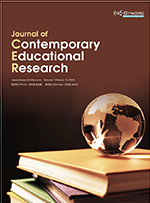Abstract
The English Curriculum Standards particularly emphasize that “we should pay attention to the emotions of each student, cultivate their interest in learning English, help them build a sense of achievement and self-confidence in learning, and enable them to develop comprehensive language-using capabilities, improve humanistic qualities, enhance practical skills, and cultivate a spirit of innovation in the learning process.” The foreign language learning process is an informationprocessing process in which both subjective and objective factors play a great influence. Subjective factors are factors related to the quality of the informant himself, such as cognitive factors, affective factors, and age influence, among which the influence and role of affective factors on foreign language information cannot be ignored. In the teaching process, it is required that teachers use the knowledge of pedagogical psychology for the in-depth understanding of the students and their psychological and emotional needs, and attempt to satisfy them, so that they can have positive emotions and feelings.
References
Jin Y, 2002, Teacher’s Reader of English Curriculum Standards for Full Time Compulsory Education in Ordinary Senior High Schools. Huazhong Normal University Press, 2002(03): 15–17.
Dai M, 2000, Emotional Factors and Their Definition. Foreign Language Teaching and Research, 2000(08): 45–49.
Liu R, 1990, Several Factors Determining Language Learning. Foreign Language Teaching and Research, 2(07): 61–65.
Zhou X, 1995, Encyclopedia of English Education in Chinese Middle Schools. Northeastern University Press, 1995(06): 32–34.
Fei Q, 2016, The Application of Passionate Teaching Method in Primary School English Teaching. Inner Mongolia Education (Vocational Education Press), 2016(05): 72.
Li Z, 2016, The Application of Stage Teaching Method in Primary School English Teaching. English Teacher, 2016(06): 78–80.
Li L, 2016, The Effective Application of Exaggeration Techniques in Primary School English Classroom Teaching. Education Modernization, 2016(09): 272–274.
Yu Q, Teaching Plan Design for Junior High School English Speaking in the Information Technology Environment, dissertation, Shenyang Normal University.
Du X, 2019, Research on English Lesson Plan Design that Reflects Cultural Characteristics in the Modern Information Technology Environment, dissertation, Shenyang Normal University.
Li Y, 2016, On the Reform of Primary School English Classroom. Asia Pacific Education, 2016(01): 40.
He Y, 2016, The Impact of PBL Model on Primary School English Self-Efficacy. Science and Education Wenhui (Mid-Term), 2016(01): 110–111.
Wang D, 2016, How to Make “Movement” the Main Theme of Primary School English Classrooms. Science Popularization (Science Education), 2016(02): 68.
Jin W, 2016, On the Application of “Micro-Lessons” in Primary School English Teaching. Exam Weekly, 2016(29): 103.
Liu S, 2016, The Application of Story Teaching Method in Primary School English Teaching. Heilongjiang Education (Theory and Practice), 2016(03): 56–57.
Chen R, 2023, Discussion on the Use of Guidance Cases in Middle School English Teaching. Reading, Writing and Arithmetic-Teaching and Research Edition, 2023(0017): 169.
